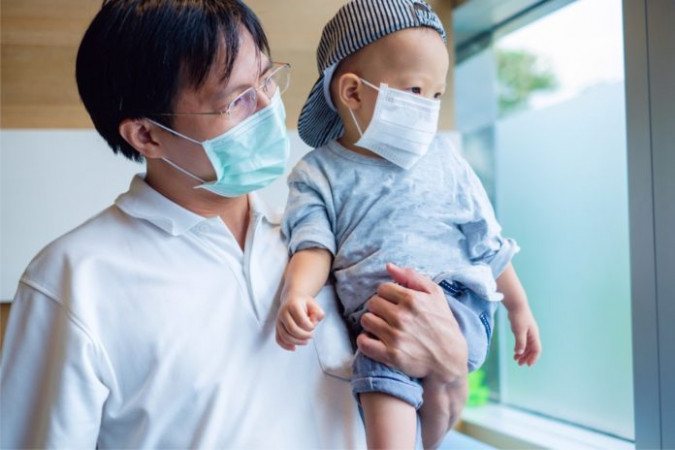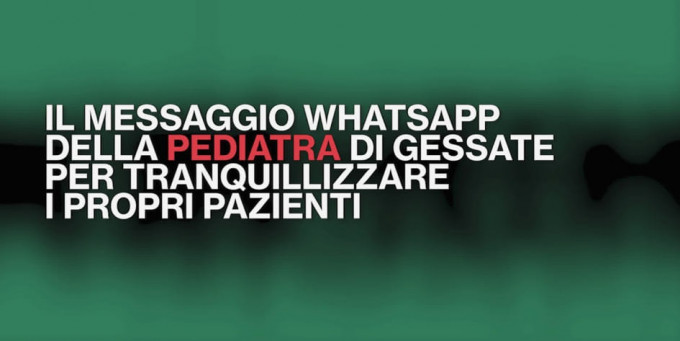Christmas: new mums worried about covid at Christmas parties.

During this time finding out you are pregnant can really be a ray of light in the storm. Between the covid, the quarantines and the tampons, living life serenely and without worries has become almost impossible. Celebrating holidays away from relatives, or with a small circle of people, we enjoyed it the first year, afterwards we wanted to go back to our long tables full of food.
If, on the other hand, the baby has just been born and is only a few months old, the mother's anxiety becomes even more real. Being able to see and touch it, living it every day as a small being to care for and defend, you feel even more responsible for making decisions that could put its health at risk.
Some people write to us:
"I have a 3 month old baby now, we are taking him on his first plane trip to spend Christmas with my in-laws. We will be in a house full of family for a whole week. All the adults he will meet are vaccinated, but there will be a few unvaccinated children. It will be great to see everyone, but I'm vacillating between moderate to extreme anxiety for the entire trip."
And then another mom writes "We have only purchased refundable flights and are prepared to cancel all of our plans if the case numbers increase even if it means postponing my daughter's first meeting with her grandparents again. ”
While vaccines have made reunions much safer this season, there are still many complicated unknowns. As with revolutionary infections? What about the Delta variant? What about the risks to unvaccinated young children, particularly those too young to wear masks? How do you make decisions to protect everyone without creating unnecessary social embarrassment or going crazy? More specifically: should I let relatives keep my baby!
To get some answers, I spoke with several pediatric health experts. Here's what they recommended.
Should we quarantine ourselves before gathering?
Vaccinated people don't need to quarantine before or after travel, but unvaccinated people should do so for seven days.
Does this apply to children?
Parents need to make a decision based on their risk profile. For children who are too young to be vaccinated, I would recommend self-quarantine if they come into contact with anyone else who is unvaccinated, elderly or has chronic health problems or immune suppression.
Do I need to do any quick tests?
If you're traveling, I think rapid testing is a good idea. Even if everyone in your group is vaccinated, rapid testing before and after you arrive adds an extra layer of safety."
Of course, rapid tests, especially the ones you do at home, aren't perfect. "They're not as sensitive to picking up very small amounts of virus, so you may want to test twice, a few days apart.
Can relatives keep my baby?
When we asked our pediatrician what we could do to keep our baby healthy in the midst of a crowd of loving relatives, she suggested asking everyone to wear a mask while holding him and of course washing their hands before picking him up. She then added "Parents are often afraid to make these requests of relatives, but the health of the newborn is more important, so if you need a scapegoat blame the pediatrician, say she told you to do it!"
In addition, masks will also help protect your baby from many gross viruses, many of which are more likely to make your baby sick than COVID.
How can I travel safely?
It's impossible to stay six feet away from people while you're, say, waiting in line at a packed airport or struggling with a car seat in a hatbox. But anything you can manage is better than nothing. Any barrier you can create between your child and other people is helpful. This might include a breathable blanket draped over your child's stroller or a baby carrier with a protective visor.
Try to take direct flights and minimize your time at the airport.
How do I know if I'm making a safe decision?
It is important to understand your risk tolerance and communicate it.
What is 'risk tolerance'?
The definition is pretty tricky: your risk tolerance has to do with who you're trying to protect. Is it an older, unvaccinated grandparent? Or is it a young child who is healthy and has some immunity from their mother?
In fact although infants and toddlers may seem vulnerable, they tend to be at lower risk if they are healthy overall. Honestly I would be more concerned about someone who has no immunity and is more likely to get very sick, like an unvaccinated grandparent.
Whatever you decide, choose your boundaries and then communicate them clearly. With your partner(s) make sure you are in agreement and supportive of the people around you so that there is no conflict.
Wherever your risk lies, you must be willing to stand your ground and not let anyone judge you. We are moms and it is our right to set the boundaries for our baby's health.
Coronavirus and newborns: what's there to know?
What's the coronavirus? The Coronavirus identified in Wuhan, China, for the first time in late 2019 is a new virus strain that has never previously been identified in humans. It has been called SARS-CoV-2 and it is the respiratory..
ReadWhy does Covid-19 affect children less?
Says Lorenza Crippa, pediatrician from Gessate (Milan), through a long message spread through the whatsapp platform. - Don't give in to panic - explains the paediatrician Crippa - It is my duty as a doctor to tell you that in these..
Read

